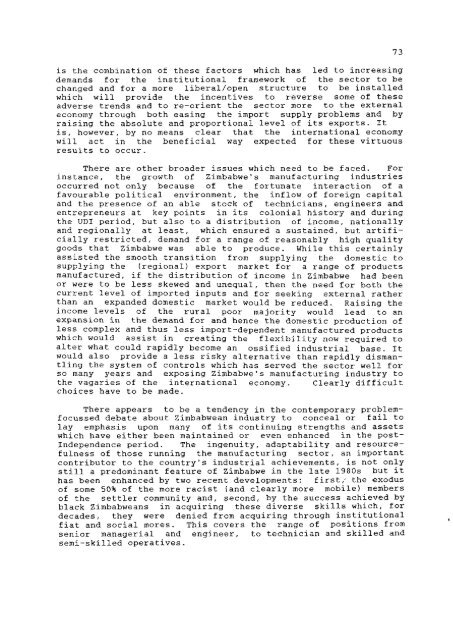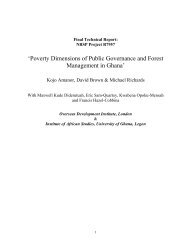Zimbabwe - Overseas Development Institute
Zimbabwe - Overseas Development Institute
Zimbabwe - Overseas Development Institute
Create successful ePaper yourself
Turn your PDF publications into a flip-book with our unique Google optimized e-Paper software.
i s the combination of these f a c t o r s which has led to i n c r e a s i n g<br />
demands f o r the i n s t i t u t i o n a l framework of the sector to be<br />
changed and f o r a more l i b e r a l / o p e n s t r u c t u r e to be i n s t a l l e d<br />
which w i l l provide the i n c e n t i v e s to reverse some of these<br />
adverse trends and to r e - o r i e n t the sector more to the e x t e r n a l<br />
economy through both easing the import supply problems and by<br />
r a i s i n g the absolute and p r o p o r t i o n a l l e v e l of i t s exports. I t<br />
i s , however, by no means c l e a r that the i n t e r n a t i o n a l economy<br />
w i l l act i n the b e n e f i c i a l way expected f o r these v i r t u o u s<br />
r e s u l t s to occur.<br />
There are other broader issues which need to be faced. For<br />
instance, the growth of <strong>Zimbabwe</strong>'s manufacturing i n d u s t r i e s<br />
occurred not only because of the fortunate i n t e r a c t i o n of a<br />
favourable p o l i t i c a l environment, the i n f l o w of f o r e i g n c a p i t a l<br />
and the presence of an able stock of t e c h n i c i a n s , engineers and<br />
entrepreneurs at key points i n i t s c o l o n i a l h i s t o r y and during<br />
the UDI period, but also to a d i s t r i b u t i o n of income, n a t i o n a l l y<br />
and r e g i o n a l l y at l e a s t , which ensured a sustained, but a r t i f i <br />
c i a l l y r e s t r i c t e d , demand f o r a range of reasonably high q u a l i t y<br />
goods that <strong>Zimbabwe</strong> was able to produce. While t h i s c e r t a i n l y<br />
a s s i s t e d the smooth t r a n s i t i o n from supplying the domestic to<br />
supplying the (regional) export market f o r a range of products<br />
manufactured, i f the d i s t r i b u t i o n of income i n <strong>Zimbabwe</strong> had been<br />
or were to be l e s s skewed and unequal, then the need f o r both the<br />
current l e v e l of imported inputs and f o r seeking e x t e r n a l rather<br />
than an expanded domestic market would be reduced. R a i s i n g the<br />
income l e v e l s of the r u r a l poor majority would lead to an<br />
expansion i n the demand for and hence the domestic production of<br />
l e s s complex and thus l e s s import-dependent manufactured products<br />
which would a s s i s t i n c r e a t i n g the f l e x i b i l i t y now required to<br />
a l t e r what could r a p i d l y become an o s s i f i e d i n d u s t r i a l base. I t<br />
would also provide a l e s s r i s k y a l t e r n a t i v e than r a p i d l y dismant<br />
l i n g the system of c o n t r o l s which has served the sector w e l l f o r<br />
so many years and exposing <strong>Zimbabwe</strong>'s manufacturing industry to<br />
the vagaries of the i n t e r n a t i o n a l economy. C l e a r l y d i f f i c u l t<br />
choices have to be made.<br />
There appears to be a tendency i n the contemporary problemfocussed<br />
debate about <strong>Zimbabwe</strong>an i n d u s t r y to conceal or f a i l to<br />
l a y emphasis upon many of i t s continuing strengths and assets<br />
which have e i t h e r been maintained or even enhanced i n the post-<br />
Independence period. The ingenuity, a d a p t a b i l i t y and resourcefulness<br />
of those running the manufacturing sector, an important<br />
c o n t r i b u t o r to the country's i n d u s t r i a l achievements, i s not only<br />
s t i l l a predominant feature of <strong>Zimbabwe</strong> i n the l a t e 1980s but i t<br />
has been enhanced by two recent developments: f i r s t , - the exodus<br />
of some 50% of the more r a c i s t (and c l e a r l y more mobile) members<br />
of the s e t t l e r community and, second, by the success achieved by<br />
black <strong>Zimbabwe</strong>ans i n a c q u i r i n g these d i v e r s e s k i l l s which, f o r<br />
decades, they were denied from a c q u i r i n g through i n s t i t u t i o n a l<br />
f i a t and s o c i a l mores. This covers the range of p o s i t i o n s from<br />
senior managerial and engineer, to t e c h n i c i a n and s k i l l e d and<br />
s e m i - s k i l l e d operatives.
















